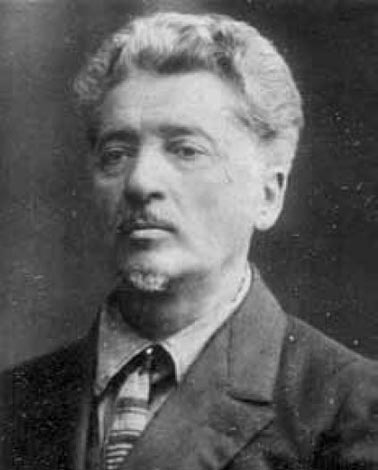Vetukhiv, Oleksa
Vetukhiv, Oleksa [Ветухів, Олекса; Vetuxiv], b 27 March 1869 in Ternova, Vovchansk county, Kharkiv gubernia, d 10 December 1941 in Kharkiv. Ethnographer, folklorist, linguist, and specialist in pedagogy; father of Mykhailo Vetukhiv. Scion of a family of Orthodox priests resident in Kharkiv from 1881, Vetukhiv studied at Kharkiv University under Oleksander Potebnia and graduated in 1892. Subsequently, he worked as a teacher and librarian at Kharkiv Commerical College and was an active member of the Kharkiv Literacy Society, as well as of the Board of Trustees of the Fund for an Improved Instruction of Deaf Mutes in the City and the Eparchy of Kharkiv. A substantial part of his scholarly activities took place under the auspicies of Kharkiv Historical-Philological Society, where he served, from 1895, as secretary of the Pedagogical Division and co-edited the division’s Trudy (Proceedings).
Arrested by the Cheka in 1922, he was released thanks to the efforts of his university colleagues. He later joined the faculty of the Academy of Theoretical Knowledge, the Artem Communist University, and Kharkiv Institute of People's Education, and also oversaw the Ethnographical and Regional Studies Section of the Scientific Research Institute of the History of Ukrainian Culture headed by Dmytro Bahalii (all in Kharkiv). In the 1930s, however, he lost his posts and had to earn his living by occasional jobs until he was granted, in February 1941, a personal pension from the Academy of Sciences of the Ukrainian SSR.
Vetukhiv was the author of nearly one hundred popular and scholarly publications, focusing on four main areas: 1) folklore; 2) linguistics and poetics; 3) pedagogy; and 4) Oleksander Potebnia’s theoretical heritage. In a letter to the Russian theologian and scientist Pavel Florensky, dated 30 November 1908, Vetukhiv stated that his own studious writings were meant ‘to put into scholarly practice the academic ideals of Potebnia, to give flesh and blood to, so to speak, their outline or skeleton that Potebnia left behind.’ On such a basis, he tried to achieve methodological consistency in his own studies that encompassed various subjects related to a number of different scholarly disciplines.
Vetukhiv’s most prominent contributions to folklore studies are his Narodnye kolybel'nye pesni (Folk Lullabyes, 1892) and Zagovory, zaklinaniia, oberegi i drugie vidy narodnogo vrachevaniia, osnovannye na vere v silu slova (Spells, Incantations, Precautious Sayings, and Other Forms of Folk Healing Based on Faith in the Power of the Word, 2 vols, 1902, 1907), in which he used material taken from Ukrainian, Russian, Belarusian, Polish, Czech, Serbian, Bulgarian, German, Latin, and Persian popular traditions.
In linguistics, he combined field studies, such as pioneering descriptions of Ukrainian dialects spoken in Starobilsk county (1893), with broad theoretical generalizations addressing the relation between language, poetic creativity, and scientific cognition, in such works as Iazyk, poeziia i nauka (Language, Poetry and Science, 1894) and Filosofskie voprosy pri svete iazyka (Questions of Philosophy in Light of Language Data, 1899). At the same time, he also adapted these theories to practical pedagogical purposes in such books as Zhizn' slova: osnovy tieorii sloviesnosti dlia shkoly i samoobrazovaniia (The Life of the Language: Fundamentals of a Theory of Poetics for School and Self-Instruction, 1910; Ukrainian edition under the title Zhyttia slova: Osnova teoriï poetyky, 1925), Proshloe rodnogo iazyka i osnovy stroeniia slova i rechi (The Past of the Native Tongue and the Essential Structure of the Word and Speech, 1920).
Vetukhiv paid considerable attention to problems of the education of deaf and dumb persons and to the development of teaching methods in general. In particular, he advocated the benefits of using mother tongue in primary schools, evoking in this connection the ideas of Jan Amos Komenský (to whose intellectual legacy he dedicated a special study published in 1893) that were congruous with the views of Oleksander Potebnia. Concomitant with it was Vetukhiv’s thesis about the undesirability of bilingualism at an early age, which triggered, in 1910–11, his theoretically momentous polemic with Leonid Bulakhovsky, a scholar who only partially conformed to Potebnia’s teachings.
Another aspect of Vetukhiv’s adherence to Oleksander Potebnia’s intellectual legacy was his participation in editing and publishing a number of Potebnia’s works, as well as his efforts to propagate Potebnia’s ideas both in scholarly circles and among the general public by means of lecture courses and publications in periodicals of various types. His study ‘Towards an Understanding of Potebnia’ (1926) was translated into English and published in the Annals of the Ukrainian Academy of Arts and Sciences in the United States, vol 5, nos 2–3 (1956).
BIBLIOGRAHY
Vakulenko, Serhii. ‘Mova ta matematyka: postpotebnians'ka teroretychna koliziia Oleksy Vetykhova i Leonida Bulakhovs'koho,’ Materialy mizhnarodnoï slavistychnoï konferentsiï pamiati profesora Kostiantyna Trofymovycha (1923–1993) (Lviv, 1998)
Vakulenko, Serhii. ‘Le rapport langage/mathématiques d’après Oleksa Vetuxiv et Leonid Bulaxovs'kyj: une controverse théorique sur les pas d’Alexandre Potebnia et sa continuation dans la linguistique ukrainienne,’ Histoire Épistémologie Langage, vol XXI, fasc 1 (1999): Linguistiques de langues slaves
Marchenko, Elena; Kalinichenko Irina. ‘Aleksej Vetukhov: sud'ba na izlome epokh,’ Lun'ovs'ki chytannia. Materïaly naukovo-praktychnykh seminariv (2010–2014 rr.), eds. O. Pavlova et al (Kharkiv 2014)
Toporkov Andrej. ‘Vetukhov Aleksej Vasil'evich,’ Russkije fol'kloristy. Biobibliograficheskij slovar'. XVIII–XIX vv., ed. T. Ivanova, vol 1: A–G (Saint Petersburg 2016)
Cheremska, Ol'ha. ‘Filolohichna shkola Oleksandra Potebni v otsintsi Oleksiia Vetukhova,’ Ukraïns'ka mova, no 4 (2018)
Serhii Vakulenko
[This article was written in 2022.]

